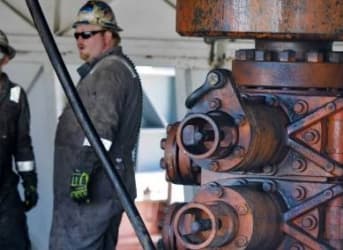Deciding on what to do about oil investments is not easy under the best of circumstances right now. Ask ten investment experts where oil is headed or what to do about investments in the sector, and it is likely you will get 10 different answers. With that said, some investment decisions are clearly less palatable and more risky than others. Take the case of Ultra Petroleum (UPL) for instance.
Ultra Petroleum Corp (UPL) has gone from being a $50 stock in 2011 and a $15-20 stock last year to being a ~$0.50 stock today. The company received a recent share price deficiency notice from the NYSE, and while the firm can take actions – like a reverse split – to correct the issue, that doesn’t solve the underlying fundamental issue. At its core, UPL has gone from having equity value of several billion U.S. dollars, to less than $100 million in equity. That fundamental problem is not so easy to fix. Related: After Years of Fracking, What do We Know?
The problem here is one of economics, and it is going to be very difficult to solve even if oil prices go back up. Moreover, UPL is not alone in facing this dilemma. Many energy companies are already past the point of no return – their businesses may never be the same even if oil prices rise again. UPL has almost $4 billion of debt, which was issued for a business built around a different paradigm in energy. Ultra is reportedly in talks with lenders over its debt burden, which may help equity holders marginally. Yet for many shareholders – particularly long term investors in the firm and ETFs who hold shares in the company – much of the stock’s value destruction may be permanent.
Past research studies I have done have found that on average even over a five-year period price shocks like the one UPL has experienced are at least 75 percent permanent. That means that on average, when a company experiences a downward price movement of this magnitude, even if it survives for another 5 years, no more than 25 percent of the value is generally recovered. This is just an average of course, and there are always exceptions. Perhaps UPL is such an exception – but the odds are against investors making that bet. Related: What Happens When Oil Hits $50?
At this point, the immediate concern for UPL shareholders and the primary consideration at the moment is whether UPL will enter bankruptcy or some de facto form of restructuring which abrogates the ability of shareholders to ever recover their losses. Ultra is in violation of several of its debt covenants including its 3.5X leverage ratio covenant, it’s PV-9 covenant, and the Going-Concern covenant.
UPL’s assets are high quality in that they are very productive – the problem is that the economics of oil and especially natural gas are abysmal. The secondary market for O&G assets is terrible right now, with bid and ask prices very far apart. Desperate sellers are generally trying to price assets based either on sunk costs or predicated on the notion that oil prices will rise again in the near future. Buyers are much less willing to accept those valuations, and while there is certainly some embedded option’s value that should be added to most asset prices, that value is not as large as buyers are expecting in many cases. Related: The Current Oil Price Rally Is Reaching Its Limits
Given that, the incentive for lenders on UPL is probably a negotiated settlement and restructuring (including one that wipes out equity holders). The alternatives for lenders are to either take over the properties with the hopes they can operate them more effectively than UPL management did – an unlikely prospect – or to try and sell the property to other buyers, an equally unappealing prospect. About the only investors that stand to gain in the current environment are deep pocketed private equity firms. For everyone else, there are few good options.
By Michael McDonald of Oilprice.com
ADVERTISEMENT
More Top Reads From Oilprice.com:
- Is This The Most Intricate Oil Theft Operation Yet?
- $40 Billion LNG Project In Australia Cancelled Amid Low Prices
- Oil Prices Fall Fast On Huge Inventory Build


















